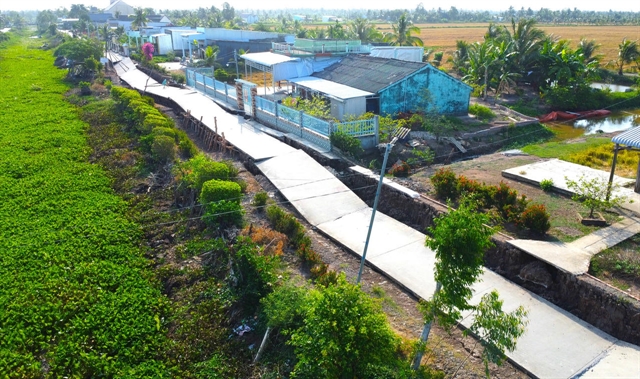 Environment
Environment

 |
| Climate change continues to pose serious challenges to the sustainable development of the Mekong Delta region. — Photo baophapluat.vn |
MEKONG DELTA — Experts have urged the Government to introduce special policies and dedicated financial mechanisms to help the Mekong Delta adapt to the growing impact of climate change, which is increasingly threatening livelihoods and the long-term economic stability of the region.
Ngô Ngọc Chuẩn, deputy director of An Giang Radio and Television, said that while Việt Nam has made strong progress in innovation and digital transformation, the country’s sustainable growth in the coming decade will depend largely on how effectively the Mekong Delta – the nation’s key rice, fruit, and aquaculture hub – can respond to saltwater intrusion, drought, and riverbank erosion.
“The Mekong Delta needs a comprehensive and long-term support mechanism, including a dedicated central budget for climate adaptation projects through 2030,” Chuẩn said.
He proposed that this should cover technical assistance for developing salt-tolerant crop varieties, helping farmers shift to adaptive agricultural models, building anti-erosion dykes, and creating a disaster insurance fund to protect farmers from increasing environmental risks.
According to Chuẩn, infrastructure development is also crucial for enhancing regional resilience.
He emphasised the importance of ensuring an adequate supply of sand and construction materials to accelerate major expressway projects such as Châu Đốc – Cần Thơ – Sóc Trăng and Cần Thơ – Cà Mau, which have a total investment of about VNĐ120 trillion (US$4.7 billion).
These highways, he said, will strengthen logistics networks, reduce transportation costs, and enhance the competitiveness of local agricultural exports.
“Infrastructure investment will not only connect provinces but also give the Delta a stronger foundation for sustainable growth,” he said.
He further noted that capacity building for local officials, particularly in information technology and digital management, should be a priority.
“Synchronised and interconnected data systems between central and local governments will make administrative procedures faster and more transparent, creating real convenience for both citizens and businesses,” Chuẩn said.
Sharing similar views, Huỳnh Văn Thòn, chairman of the Board of Directors of Lộc Trời Group, stressed that sustainable development must be at the heart of all national policies for the 2026-30 period and beyond.
“The Mekong Delta is on the frontline of climate change – salinity, floods, and droughts are directly threatening farmers’ incomes and food security,” Thòn said.
He emphasised that the Party, State, and National Assembly should soon establish a clear legal framework and technical standards for the circular economy, enabling environmentally friendly and low-carbon production models to expand nationwide.
“Without a stable legal environment, businesses that want to invest in sustainable agriculture and green industry still face many uncertainties,” he noted.
Thòn also proposed preferential policies for capital access, land use, and taxation for projects in renewable energy, clean agriculture, and carbon-reduction industries.
Such incentives, he said, would not only support Việt Nam’s economic transformation but also help achieve the goal of net-zero emissions by 2050.
“If we want green growth, we must create conditions for businesses to lead that transition,” he added.
He further underlined that human capital is the cornerstone of all sustainable development.
“We need to reform vocational education, link schools with enterprises, and train a generation of skilled workers ready for the global value chain,” Thòn said.
According to him, a well-trained and adaptable workforce will be the decisive factor in the Mekong Delta’s resilience and competitiveness in the years ahead.
At the same time, Thòn called for strengthened social welfare systems, including health insurance and unemployment benefits, to provide a safety net for workers in times of economic or environmental disruption.
“Protecting livelihoods and maintaining social stability are essential to ensure people’s trust and participation in sustainable development,” he said.
With its fertile land and abundant natural resources, the Mekong Delta contributes nearly 18 per cent of Việt Nam’s GDP and over half of the nation’s rice output.
Yet the region now faces unprecedented environmental stress.
Experts agree that targeted financial and institutional support – coupled with stronger investment in human resource, technology, and green infrastructure – will determine whether the Delta can transform from a vulnerable agricultural basin into a resilient and sustainable growth engine for the entire country. — VNS